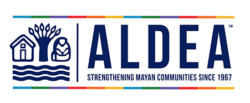
Xiquín Sanahí is a larger community of 200 families, or about 1,240 people, located four miles north of the municipal seat of Comalapa. In the Kaqchikel language, “Xiquín Sanahí” means “by the riverbank,” because the community is bordered by a river. About 50 percent of the population speaks only Kaqchikel, and the other 50 percent speak both Kaqchikel and Spanish. Ninety percent of the community members are Catholic, and the rest are Evangelical.
Agriculture is the main productive activity in the community, especially sweet peas, broccoli, French beans, corn, and beans. Women normally weave, and some people work as nurses and policemen. Xiquín Sanahí has two schools serving 200 students from kindergarten through sixth grade. About 90 students attend 7th through 9th grade at the “telesecundaria,” an educational model in Guatemala where students learn everything through visual media, without teachers.
A health post in the community run by a nurse is open four days a week. The post does not offer medicines, just very basic medical attention and vaccines for children. Eighty percent of the roads are paved, and all the homes have electricity. About 70 percent of the families are connected to a water system that does not work well, and their water source is about to dry out.
Our Partnership:
ALDEA and ABPD began working with 55 Xiquín Sanahí families in July 2019 that completed our integrated program in May 2023. Click here to learn more about how we work with our partner communities and visit our blog to stay up to date with the latest developments on the ground in Guatemala!
